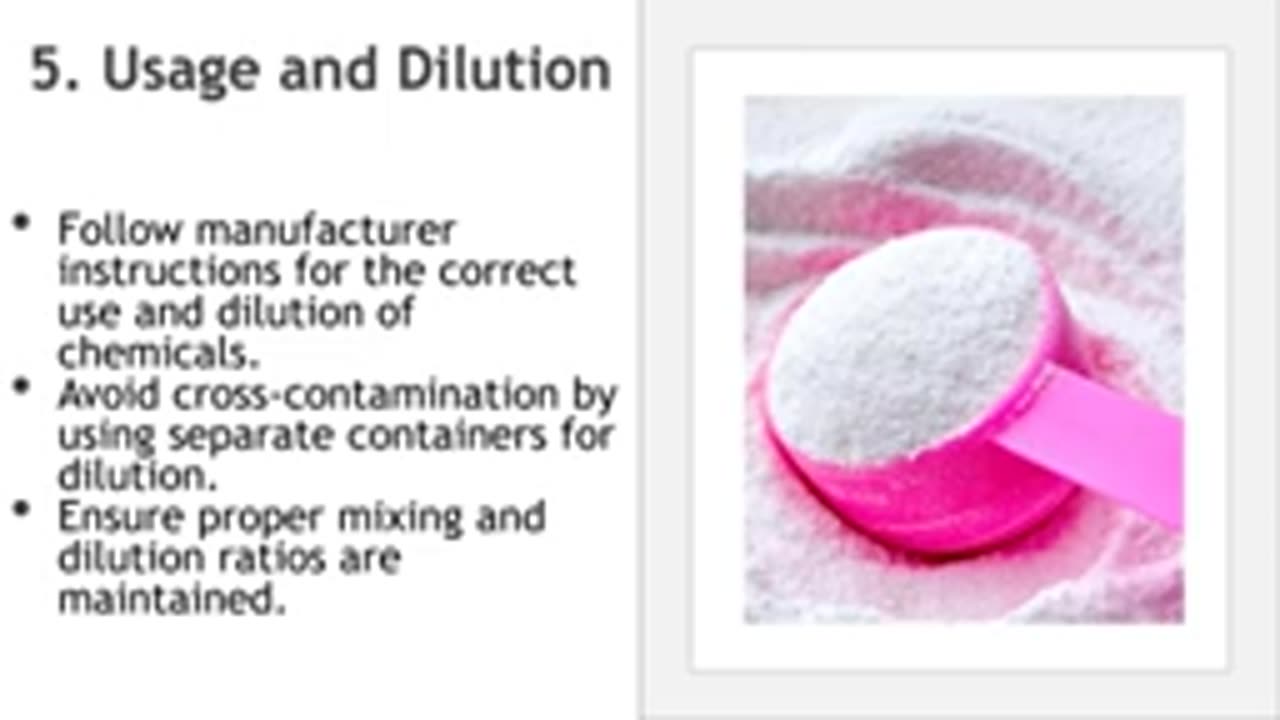Premium Only Content

Chemical Control in the Food Industry │ Food Safety
Chemical control in the food industry is an essential component of food safety, ensuring that harmful chemicals do not compromise the quality of food products or pose risks to human health. Effective chemical control measures involve identifying, monitoring, and managing chemical hazards throughout the food production and supply chain.
### Key Areas of Chemical Control in Food Safety:
#### 1. **Chemical Hazards in Food**
- **Pesticides**: Residues from agricultural chemicals used in crop production.
- **Food Additives**: Excessive or inappropriate use of preservatives, colorants, and flavor enhancers.
- **Contaminants**: Heavy metals (e.g., lead, mercury), mycotoxins, and dioxins.
- **Allergens**: Cross-contamination or undeclared allergens in food products.
- **Cleaning Agents**: Residual cleaning chemicals used in food processing equipment.
#### 2. **Good Manufacturing Practices (GMP)**
- Use of approved chemicals for food production and processing.
- Ensuring the correct concentration of cleaning agents and sanitizers.
- Proper storage and labeling of chemicals to prevent accidental contamination.
#### 3. **Hazard Analysis and Critical Control Points (HACCP)**
- Identifying critical control points where chemical hazards might occur.
- Implementing controls to prevent, eliminate, or reduce hazards to acceptable levels.
#### 4. **Regulations and Standards**
- Compliance with national and international food safety standards (e.g., Codex Alimentarius, FDA, EFSA).
- Regular testing for chemical residues and contaminants.
- Adherence to Maximum Residue Limits (MRLs) for pesticides and veterinary drugs.
#### 5. **Monitoring and Testing**
- Routine sampling and analysis of raw materials, intermediate, and finished products.
- Employing advanced analytical methods (e.g., chromatography, spectrometry) to detect and quantify chemicals.
#### 6. **Training and Awareness**
- Educating employees about the risks associated with chemical hazards.
- Training on proper handling, storage, and disposal of chemicals in the workplace.
#### 7. **Emergency Preparedness**
- Developing response plans for accidental chemical contamination.
- Implementing traceability systems to recall affected products quickly.
### Benefits of Effective Chemical Control
- Ensures consumer health and safety.
- Builds trust in food brands and products.
- Reduces the risk of regulatory non-compliance and associated penalties.
- Minimizes environmental impact through controlled chemical usage.
Would you like more details on any of these areas?
-
 2:12:46
2:12:46
Price of Reason
1 day agoAmber Heard BACKS Blake Lively Lawsuit Against Justin Baldoni! Is Disney CEO Bob Iger in TROUBLE?
69.1K24 -
 1:01:17
1:01:17
The StoneZONE with Roger Stone
20 hours agoChristmas Edition: Why the Panama Canal is Part of the America First Agenda | The StoneZONE
139K51 -
 18:12:15
18:12:15
LFA TV
1 day agoLFA TV CHRISTMAS EVE REPLAY
150K19 -
 13:32
13:32
Scammer Payback
22 hours agoChanging the Scammer's Desktop Background to his Location
18.9K4 -
 4:21
4:21
BIG NEM
1 day agoNikola Tesla's Secret to Cultivating Creativity & Genius
14.3K1 -
 15:03
15:03
The Anthony Rogers Show
1 day agoAnthony Rogers - Live at Cusumano's Pizza (Upstairs)
11.3K1 -
 4:33:48
4:33:48
tacetmort3m
1 day ago🔴 LIVE - THE ZONE KEEPS PULLING ME BACK - STALKER 2 - PART 15
75.7K13 -
 22:45
22:45
Brewzle
1 day agoI Went Drinking In A Real Bourbon Castle
54.1K4 -
 48:36
48:36
PMG
2 days ago $5.34 earned"Parkland Parent Speaks Out On Kamala Harris Using Victims"
43.9K12 -
 4:06
4:06
The Lou Holtz Show
1 day agoCoach Lou Holtz’s Heartfelt Christmas Message 🎄 | Family, Faith & Notre Dame Spirit 💚 #christmas
31.9K1